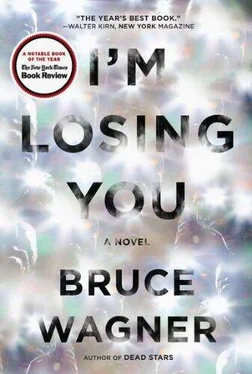The doctors said in the first year of an illness like Perry’s—“stage-four adenocarcinoma”—there was ninety percent mortality; after twelve months, a hundred percent. Chemotherapy might add six or eight weeks. When Perry asked how long the treatment lasted, they said, “You’ll never get off it.” You did the chemo until you died, what candid caretakers described as more a “leeching” than anything else.
Curiously, he didn’t have much fight in him. The professionals translated that as depression, but Perry didn’t feel depressed. He felt like one of those existentialist anti-heroes in the novels he’d read back in college — dreamily disburdened. Maybe all that would change, he thought, and in a few months he’d wake up screaming for Mommy the way pilots sometimes lose it when they go down. That Perry was asymptomatic didn’t help him feel less surreal about his predicament; blood-stool or a little double vision would have gone a long way. At least then, he could become a proper fatal invalid. As it was, the producer was living an ironic “television” reality. He even made a halfhearted stab at getting hold of kinescopes from Run for Your Life , the Ben Gazzara series where the smirking actor learns he’s terminal. It was The Fugitive , with a Camus makeover — the one-armed man was Death.
A routine X ray showed nodules on the lungs. There was the usual hopeful speculation the little balls might indicate an infectious process such as TB or histoplasmosis, transmitted by an airborne fungus kicked up by the quake. Far-fetched but within the realm of possibility. When the cancer was confirmed, his wife became obsessed with the idea the family had been exposed to something environmental. What else would explain two cancers hitting like that? The doctors said there was no connection, but they always said that — there was never a connection between anything. That they hadn’t found Perry’s “primary organ”—the point of origin — made it all the more heinously suspicious. Jersey raked over the past, when her baby was alive, searching for clues, tearing open old wounds with a monstrous fine-tooth comb.
After a decade in the Palisades they relocated to North Alpine, in Beverly Hills. Jersey had mixed emotions about giving up the house where Montgomery lived — and died — but it was time. For Rosetta, it was easy. She was getting hormones and any kind of break with the familiar foretold great adventure (you would have thought they were moving to Paris or England). The Antoine Predock trophy home — walls covered with Bleckners and Clementes — cost around four million. Across the way was Jeffrey Katzenberg’s pied-à-terre; it was that kind of neighborhood. Lately, Perry had been looking to buy a “weekender” in Malibu, and the one Jersey liked best was a few doors down from the Katzenberg beach house. You couldn’t get away from the guy.
A syndicated show about real cops made Perry Needham Howe very rich. He knew he’d gotten right place — right time lucky: in a nation of voyeurs, Streets was a front-row seat to the cartoonish orgy of crime that was the American nightmare. Imitators were legion, but Perry’s half-hour was the mother of them all. Its simplicity couldn’t be further distilled: cops chasing crooks in real time, the jiggling camera and panting, out-of-shape officers lent proceedings the kinky familiarity of coitus, without the mess — they even threw in the handcuffs. Cigarettes were smoked while spent, exhilarated fuzz offered post-bust blow-by-blows. Once in a while, if everything jibed, episodes had Emmy-worthy story arcs: like the one with the body in Hancock Park. An elderly bachelor had been murdered. His car was missing and a detective said it smelled like “sex gone bad.” (A criminologist’s phrase, currently in vogue. Perry heard a stand-up on one of the cable channels use it to define his marriage.) A local minister reports a call from a teenager in Vegas who confesses to the crime and wants to turn himself in. At the end of the show, the killer tidily appears at midnight in front of the Crystal Cathedral, no less — in the victim’s Porsche. The minister asks the cops if he can say goodbye to the wayward hustler. “Just tell the truth,” says Father Flanagan to the kid, like something out of a thirties meller. Streets could give NYPD Blue a run for its money anytime.

Perry was on his way to Club Bayonet.
He was meeting Stone Witkiss, the man who created Daytona Red , the early hotshot vice-squad hit. Stone and investors had pumped a few million into an old Mexican bar on West Washington, transforming it into a private wood-paneled oasis with a literary theme. Perry knew the preternaturally boyish Witkiss from way back — Bayonne, in fact — and enjoyed his company.
The place was packed. Steve Bochco and a few execs from UPN were at the bar and Perry said hello. Bochco complimented his show and that felt good. Cat Basquiat shared a table with Sandra Bullock, and Perry thought he saw Salman Rushdie in a far booth with Zev Turtletaub and Sherry Lansing. Stone gave him a hug and Perry followed him back. Along the way, he met Sofia Coppola and Spike Jonze, a handsome kid who made videos (Perry laughed at the resonance of the name). They liked Streets too.
The old friends settled into Stone’s corner table.
“You look great. How’s Jersey? Why didn’t she come?”
“Rosetta’s not feeling so well.”
“Jesus, what is she, sixteen now?”
“Thirteen, comin’ up.”
“What does she have, the flu?”
“I don’t know. It’s a stomach thing.”
“What does Jersey do, hold her hand ?”
“Don’t bust my balls, Stone, all right? Are you coming to the bat mitzvah?”
“Of course I’m coming to the bat mitzvah. What am I, a skeev?”
They talked like that awhile, back and forth, like old times. Then Stone hunched, discreetly nodding at a slender, well-dressed man in his early fifties.
“Guy’s a total freak . Know who he is? Patented a computer thing — something to do with screens. Worth, like, three billion dollars . Just bought a house in Litchfield, next to George Soros, two hundred and fifty acres. Jesus, did you read about Soros in The New Yorker ?” Stone ordered wine and stir-fried lobster, then circled back. “Anyway, guy lives in a thirty-room house in Palos Verdes. Contractor does a lot of work for me. There’s smoke detectors in all the bathrooms — you cannot repeat this — with tiny cameras inside, so he can watch the ladies in the can.”
Lesser lights steadily made their way to the table. The host looked a little twitchy. Wearing the hats of TV mogul/restaurateur was doing a small number on him; he hadn’t yet found the groove. Funny, Perry thought, what linked them — from Daytona Red to Streets was a bit of a stretch, but Perry knew his friend liked to think he’d somehow smoothed the way. He respected Stone because he’d been through all the hype, glamour and insanity without cracking up. Perry wondered if he should fess up about stage-four. The moment passed and the waiter brought the wine. Stone sniffed, nodding his assent.
“I was talking to this forensic pathologist about Ted Bundy,” Stone said, puffing on a cigar after the last visitors departed. “Bundy was confessing to everything in those last days — trying to forestall the execution — really blowing lunch. You know, they always talked about the ‘long hair,’ all the girls Bundy killed had long hair. The shrinks wondered who it was he was killing, over and over. Know what Bundy told this guy?” He hunched again, cocking his head, intime . “They never released this because it was too fucking hideous. You’re gonna love it. There was a simple fucking reason behind the long hair. He liked long hair because — are you ready? — because, he said, it was easier to get their heads out of the refrigerator .”
Читать дальше













